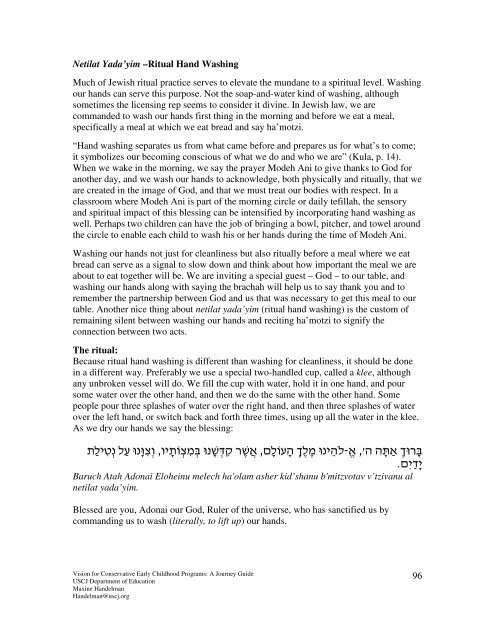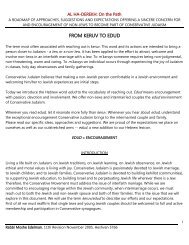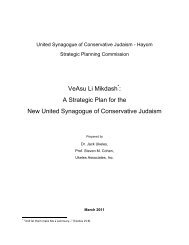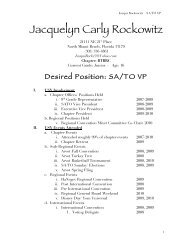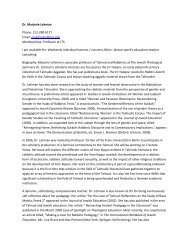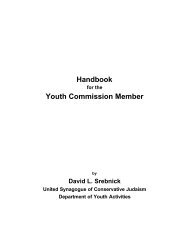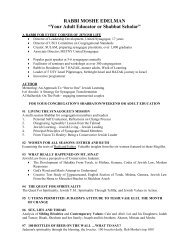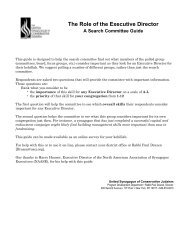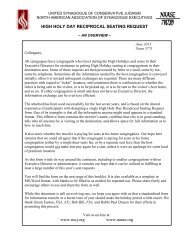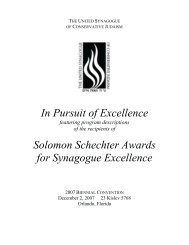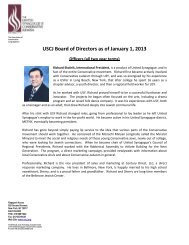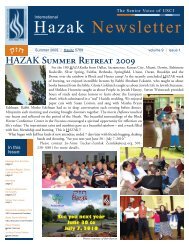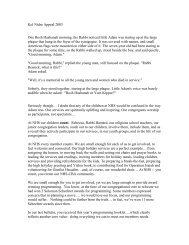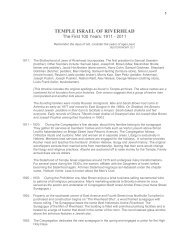Vision for Conservative Early Childhood Programs: A Journey Guide
Vision for Conservative Early Childhood Programs: A Journey Guide
Vision for Conservative Early Childhood Programs: A Journey Guide
You also want an ePaper? Increase the reach of your titles
YUMPU automatically turns print PDFs into web optimized ePapers that Google loves.
Netilat Yada’yim –Ritual Hand Washing<br />
Much of Jewish ritual practice serves to elevate the mundane to a spiritual level. Washing<br />
our hands can serve this purpose. Not the soap-and-water kind of washing, although<br />
sometimes the licensing rep seems to consider it divine. In Jewish law, we are<br />
commanded to wash our hands first thing in the morning and be<strong>for</strong>e we eat a meal,<br />
specifically a meal at which we eat bread and say ha’motzi.<br />
“Hand washing separates us from what came be<strong>for</strong>e and prepares us <strong>for</strong> what’s to come;<br />
it symbolizes our becoming conscious of what we do and who we are” (Kula, p. 14).<br />
When we wake in the morning, we say the prayer Modeh Ani to give thanks to God <strong>for</strong><br />
another day, and we wash our hands to acknowledge, both physically and ritually, that we<br />
are created in the image of God, and that we must treat our bodies with respect. In a<br />
classroom where Modeh Ani is part of the morning circle or daily tefillah, the sensory<br />
and spiritual impact of this blessing can be intensified by incorporating hand washing as<br />
well. Perhaps two children can have the job of bringing a bowl, pitcher, and towel around<br />
the circle to enable each child to wash his or her hands during the time of Modeh Ani.<br />
Washing our hands not just <strong>for</strong> cleanliness but also ritually be<strong>for</strong>e a meal where we eat<br />
bread can serve as a signal to slow down and think about how important the meal we are<br />
about to eat together will be. We are inviting a special guest – God – to our table, and<br />
washing our hands along with saying the brachah will help us to say thank you and to<br />
remember the partnership between God and us that was necessary to get this meal to our<br />
table. Another nice thing about netilat yada’yim (ritual hand washing) is the custom of<br />
remaining silent between washing our hands and reciting ha’motzi to signify the<br />
connection between two acts.<br />
The ritual:<br />
Because ritual hand washing is different than washing <strong>for</strong> cleanliness, it should be done<br />
in a different way. Preferably we use a special two-handled cup, called a klee, although<br />
any unbroken vessel will do. We fill the cup with water, hold it in one hand, and pour<br />
some water over the other hand, and then we do the same with the other hand. Some<br />
people pour three splashes of water over the right hand, and then three splashes of water<br />
over the left hand, or switch back and <strong>for</strong>th three times, using up all the water in the klee.<br />
As we dry our hands we say the blessing:<br />
,$ $ , <br />
% 7 " @ () &. %<br />
" <br />
Baruch Atah Adonai Eloheinu melech ha'olam asher kid’shanu b'mitzvotav v’tzivanu al<br />
netilat yada’yim.<br />
Blessed are you, Adonai our God, Ruler of the universe, who has sanctified us by<br />
commanding us to wash (literally, to lift up) our hands.<br />
<strong>Vision</strong> <strong>for</strong> <strong>Conservative</strong> <strong>Early</strong> <strong>Childhood</strong> <strong>Programs</strong>: A <strong>Journey</strong> <strong>Guide</strong><br />
USCJ Department of Education<br />
Maxine Handelman<br />
Handelman@uscj.org<br />
96


